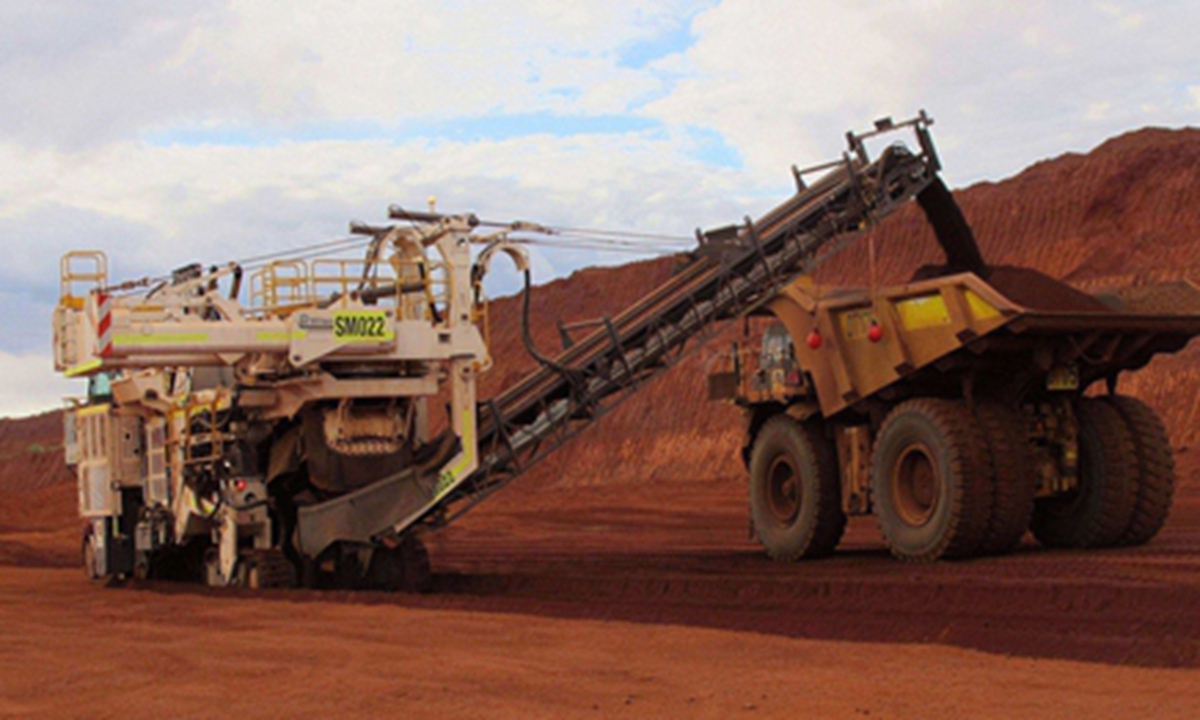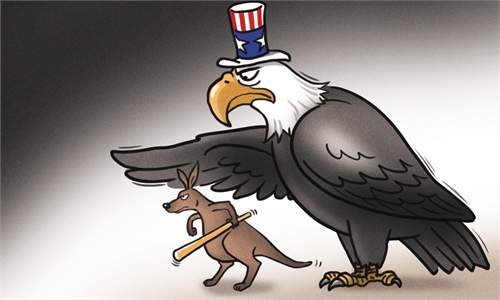Australia’s economy is about to suffer from COVID-19, tension with China, analysts say
GDP growth set to fall amid tension with China: analysts

An iron ore mining site in Australia Photo: cnsphotos
Australia's economy is about to suffer from a series of challenges, including COVID-19 outbreaks and escalating tension with its largest trading partner - China, with GDP growth expected to slow in the second quarter and to decelerate even further in the third quarter, Chinese analysts said on Tuesday.
In the third quarter, the Australian economy could plunge into a technical recession, analysts said, noting that Canberra's self-inflicted harm could have a more evident economic impact in the third quarter. China's imports of iron ore, other mineral resources and agricultural products from Australia will likely see a further slide, hammering an economy that has already been battered by COVID-19 lockdowns, according to the analysts.
Australia is scheduled to announce its second-quarter GDP on Wednesday.
Yu Lei, a chief research fellow at the Research Center for Pacific Island Countries at Liaocheng University, estimated that Australia's second-quarter GDP expanded 1.2-1.5 percent "in the best-case scenario," down from a 1.8 percent growth in the first quarter and 3.2 percent in the last quarter of 2020.
A report issued by Citigroup and AMP Capital Investors said that the Australian economy could have contracted "slightly" in the quarter ended in June, as its net export decline dragged down a robust rebound in consumption and investment.
"The market has already anticipated a slowdown in the third quarter due to contractions resulting from lockdowns, but a second-quarter drop will lay bare how souring political and economic ties with the world's second-largest economy dealt a heavy blow to a staggering economy," Yu told the Global Times on Tuesday.
Analysts noted that Australia's economy has a clear dependence on China. The Australian economy is export-oriented, mainly involving agricultural and animal husbandry products, international tourism and education, and energy and mineral products. China has been Australia's largest trading partner for a decade. China is also Australia's largest export market, accounting for 35-39 percent of Australia's total export volume.
Chen Hong, a professor and director of the Australian Studies Center at the East China Normal University, told the Global Times on Tuesday that Australia's GDP growth rates in the third and fourth quarters are "unquestionably going to be tough," because iron ore exports to China are lower. That won't necessarily be reflected in the second-quarter statistics, but it will be evident in the third and fourth quarters, Chen added.
China, which in the past imported more than 60 percent of Australia's iron ore exports - known as the latter's trade "cash cow" - has stepped up efforts in recent months to limit steel production and exports, which led to lower iron ore prices and reduced demand in the second quarter.
In July, China's iron ore imports declined for the fourth consecutive month, customs data showed, with prices down by 30 percent since mid-July.
In addition to iron ore, a huge proportion of Australian exports to China have been falling sharply, while tourism and education stalled due to the COVID-19 international travel restrictions.
According to Chen, if iron ore is factored out, Australia's trade with China would have fallen by more than 23 percent last year.
"With Australia's political hostility snowballing against China, we are witnessing a significant dwindling of favorable opinions among Chinese businesses, investors and consumers toward Australia, which is reflected in the impact on imports from Australia," said Chen.
Australia's discriminatory regulations and policies targeting Chinese mergers and acquisitions have also led to a sharp decline of investment from China, according to Chen. This could also dent Chinese enthusiasm for Australia as a destination for holidays and education when the pandemic restrictions ease.
"Fixing trade ties with China is critical for Australia to get a much-needed shot in the arm against economic headwinds for the rest of the year," Yu said. Otherwise, the country may face a technical recession that causes irreparable damage, he added.



